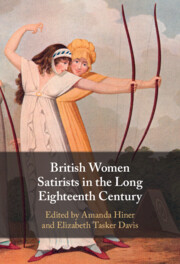Book contents
- British Women Satirists in the Long Eighteenth Century
- British Women Satirists in the Long Eighteenth Century
- Copyright page
- Dedication
- Contents
- Illustrations
- Notes on Contributors
- Acknowledgements
- Introduction
- Part I Traditions and Breaks
- Chapter 1 Women Writers and Juvenal
- Chapter 2 Unlocking the Dressing Room
- Chapter 3 Aphra Behn and Traditions of Satire
- Chapter 4 Delarivier Manley
- Chapter 5 The Pleasures of Satire in the Fables of Anne Finch
- Part II Publicity and Print Culture
- Part III Moral Debates and Satiric Dialogue
- Appendix Selected List of Eighteenth-Century Women Writers and Their Satiric Works
- Selected Bibliography and Guide to Further Reading
- Index
Chapter 4 - Delarivier Manley
Satire as Conversation
from Part I - Traditions and Breaks
Published online by Cambridge University Press: 31 March 2022
- British Women Satirists in the Long Eighteenth Century
- British Women Satirists in the Long Eighteenth Century
- Copyright page
- Dedication
- Contents
- Illustrations
- Notes on Contributors
- Acknowledgements
- Introduction
- Part I Traditions and Breaks
- Chapter 1 Women Writers and Juvenal
- Chapter 2 Unlocking the Dressing Room
- Chapter 3 Aphra Behn and Traditions of Satire
- Chapter 4 Delarivier Manley
- Chapter 5 The Pleasures of Satire in the Fables of Anne Finch
- Part II Publicity and Print Culture
- Part III Moral Debates and Satiric Dialogue
- Appendix Selected List of Eighteenth-Century Women Writers and Their Satiric Works
- Selected Bibliography and Guide to Further Reading
- Index
Summary
Delarivier Manley both ventriloquizes and parodies male classical satirical traditions as she satirically rewrites Whig narratives of the Glorious Revolution. Manley frames her retort to the male wits of her day not merely as literal conversations in her political secret histories but through a revision to the traditional genres she was working in, thus effecting the conversation at the meta-level of genre. From her early epistolary work, Letters Writen by Mrs. Manley (1696), through her best-selling New Atalantis (1709) and her Adventures of Rivella (1714), Manley demonstrates her vision of satire as a mode simultaneously in parodic conversation with classical satire, political secret history, official history, travelogue, romance, pamphlet, periodical, and memoir. Across her career, Manley created satires that were not merely “parasitic” on prior genres but were the grounds for intergeneric conversation and the invention of new hybrid genres. She well understood that the most effective retort to the Whig satirists of her era would be to redefine the genres in which the satirical history of their own time would be written.
Keywords
- Type
- Chapter
- Information
- British Women Satirists in the Long Eighteenth Century , pp. 82 - 97Publisher: Cambridge University PressPrint publication year: 2022

